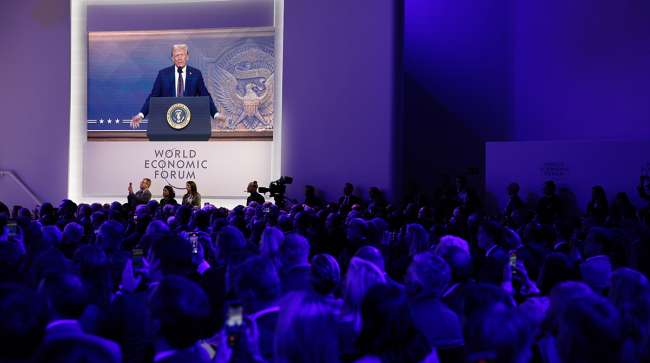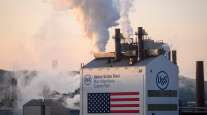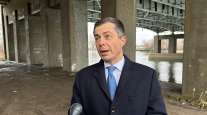Trump Urges Lower Oil Prices, Interest Rate Cuts at Davos

[Stay on top of transportation news: Get TTNews in your inbox.]
President Donald Trump said he would ask Saudi Arabia and other OPEC nations to “bring down the cost of oil” and reiterated his threat to use tariffs to bring manufacturing back to the U.S. as he addressed world leaders gathered in Davos on Jan. 23.
Trump also said he would demand an immediate drop in interest rates, which he said had ratcheted up deficits and resulted in what he cast as economic calamity under the tenure of his predecessor, Joe Biden.
“This begins with confronting the economic chaos caused by the failed policies of the last administration,” Trump said. “Over the past four years, our government racked up $8 trillion in wasteful deficit spending and inflicted nation-wrecking energy restrictions, crippling regulations and hidden taxes like never before.”
He also hailed commitments by companies to invest in the U.S., touting plans by SoftBank Group Corp. to help build artificial intelligence infrastructure and a promise from Saudi Arabia’s Crown Prince Mohammed Bin Salman to expand investments and trade with the U.S. by $600 billion.
President Trump addressed the World Economic Forum today, detailing what he has accomplished in the last 72 hours and what's ahead for America's golden age.
He covered a lot in a legendary speech. Watch some highlights in under 90 seconds! pic.twitter.com/teYh0AdiHr — The White House (@WhiteHouse) January 23, 2025
Trump said he would pressure the crown prince to raise that figure to $1 trillion and expressed dismay that the Saudis and other OPEC nations had not acted sooner to help reduce oil prices. The president predicted the cartel could decrease inflation and allow for the reduction of interest rates by lowering oil prices. He said doing so would also pressure Russia to end the war in Ukraine.
“With oil prices going down, I’ll demand that interest rates drop immediately,” Trump said. “And likewise, they should be dropping all over the world.”
The president told leaders a key push in his second term would be using tariffs to drive manufacturing back to the United States.
“If you don’t make your product in America, which is your prerogative, then very simply, you will have to pay a tariff, differing amounts, but a tariff which will direct hundreds of billions of dollars, and even trillions of dollars into our Treasury,” Trump said.
Trump appeared virtually at the forum — on a video feed that showed him behind a podium, flanked by an jumbo-sized image of the seal on the front of the president’s Resolute Desk in the Oval Office. The video feed of Trump hovered over the executives and moderator on stage at the panel. Trump was greeted by applause as he began his address.
"If you don't make your product in America... you will have to pay a tariff."
President Trump threatens tariffs on foreign products while speaking at WEF in Davos. https://t.co/MPjgQRmzjX pic.twitter.com/LukdS4y58V — MSNBC (@MSNBC) January 23, 2025
After delivering opening remarks, Trump took questions from WEF President Borge Brende and a select group of executives, who included Blackstone Inc.’s Stephen Schwarzman, Bank of America Corp.’s Brian Moynihan, TotalEnergies SE’s Patrick Pouyanne and Banco Santander SA’s. Ana Botin.
“I’m sure the crown prince of Saudi Arabia will be really glad you gave this speech today,” Schwarzman joked.
Trump used his exchange with Moynihan to air complaints from conservatives that large Wall Street institutions had denied services for clients because of conservative religious or political identities.
“I hope you start opening your bank to because many conservatives complain that the banks are not allowing them to do business within the bank, and that included a place called Bank of America,” Trump said. “They don’t take conservative business.”
Bank of America denied the allegations when a group of Republican state attorneys general raised the issue last year, saying it serviced many nonprofit and conservative organizations.
Trump is addressing the gathering of finance and business CEOs, central bank governors and political officials remotely, because of his inauguration this week, but his return to power has dominated the annual meeting — received with both enthusiasm from some quarters and concern about the policies ahead.
Trump last spoke at the forum in 2020, addressing CEOs in person only weeks before the COVID-19 pandemic shut down the world’s economy. He used that appearance to confront European leaders and urge them to compromise in trade talks or risk crippling levies on the heels of his deals with China and the United States-Mexico-Canada Agreement.
This term, the president has vowed to usher in a “golden age” for the U.S., moving to crack down on undocumented migration, and reiterating plans to hit neighboring Mexico and Canada with tariffs. He’s also insisted that levies on China and the European Union remain on the table.
David Bell, CEO of CloneOps.ai, discusses the impact of AI on the trucking industry. Tune in above or by going to RoadSigns.ttnews.com.
“From the standpoint of America, the EU treats us very, very unfairly, very badly,” Trump said Jan. 23, citing in particular taxes and regulatory burdens from European nations he cast as targeting American companies.
“They won 15 or 16 billion from Apple. they won billions from Google. I think they’re after Facebook for billions and billions,” Trump said. “These are American companies, whether you like them or not, they’re American companies, and they shouldn’t be doing that.”
In response to a question, Trump said he would guarantee U.S. energy supply security to Europe, where businesses face high energy costs and leaders are worried about keeping companies competitive globally.
“I would make sure that you get it. If we make a deal you’ll get it,” Trump said.
Domestically, Trump has moved to undo Biden-era policies designed to fight climate change, while also boosting U.S. fossil fuel production and filling up depleted oil reserves. He has also ordered his administration to consider eliminating subsidies and policies favoring electric vehicles.
Trump touted his domestic policies, including a national energy emergency, as crucial to lowering costs and boosting developing technologies such as artificial intelligence
“We’re going to build electric generating facilities, they are going to build, I’m going to get them the approval, under emergency declaration I can get the approvals done myself without having to go through years of waiting,” he said.
Trump’s agenda aims to reverse Biden’s focus on climate policies. European leaders have been rankled by Trump’s decision to pull the U.S. out of the Paris climate accords — although the move was not a surprise and fulfills one of the president’s campaign promises.
During the campaign, Trump said he would bring about a halt to Russia’s war in Ukraine even before taking office. On Jan. 23, in response to a question about whether there would be a peace deal before next year’s forum at Davos, Trump appeared to put the onus on Russian President Vladimir Putin.
“Well, you’re going to have to ask Russia,” Trump said. “Ukraine is ready to make a deal.”
Trump said he was hopeful that China could intervene to help broker peace between the two countries, saying they “had a great deal of power over that situation.” The U.S. president also suggested that he was willing to make guarantees about nuclear weapons to assuage concerns expressed by Putin.
Trump also highlighted two of his domestic priorities — renewing expiring tax cuts and pushing for a reduction in the corporate tax rate — moves he said would also help curb price growth. But he cautioned that lower corporate taxes would only benefit companies that manufactured their goods in the U.S.
“Now we’re going to bring it down from 21 to 15% if, there’s a big if, if you make your product in the U.S.,” Trump said. “It’s going to actually bring down inflation. It’s going to bring up jobs.”
Want more news? Listen to today's daily briefing above or go here for more info
In the U.S., Trump has been cheered by many of Wall Street and Silicon Valley’s most prominent and wealthy executives, won over by pledges to renew and expand tax breaks, including a lowering of the corporate rate, slash regulation and spur energy production — despite anxiety over the impact of tariffs on trade flows and immigration crackdowns. That shift is also evident at Davos, where many business and political leaders have accepted his return.
The Davos elite initially breathed a sigh of relief when Trump didn’t start new trade wars on day one but they’re also aware of his fervent belief in tariffs and acknowledge it’s a matter of time until he imposes the first tranche. World leaders, including both those who are ideological allies as well as those more critical of his worldview, have come around to the reality that he’ll be their counterpart for the next four years and that they must find a way to engage him.





